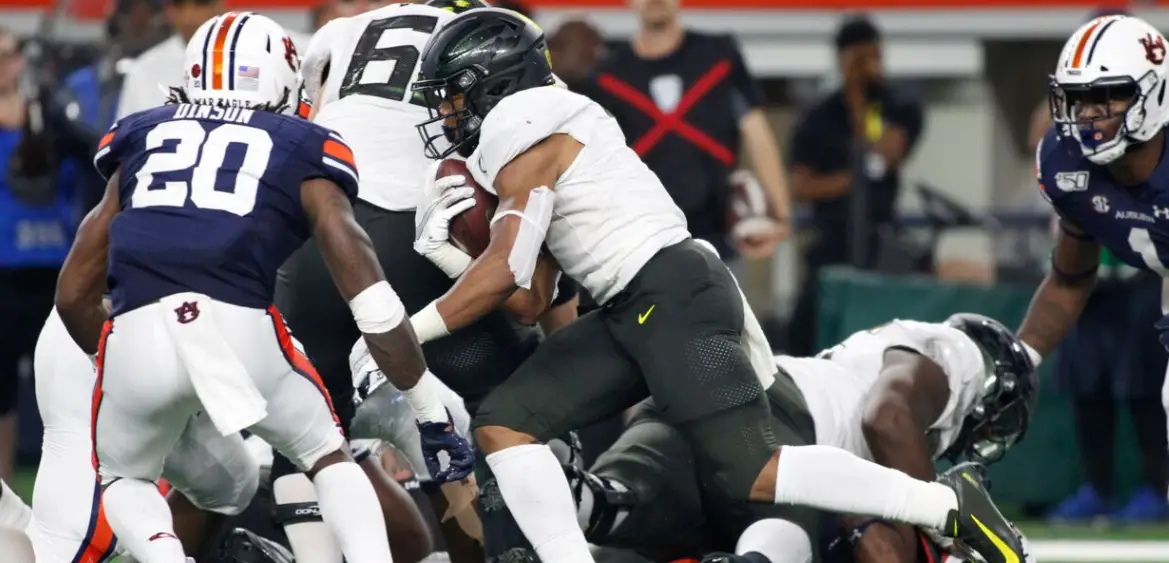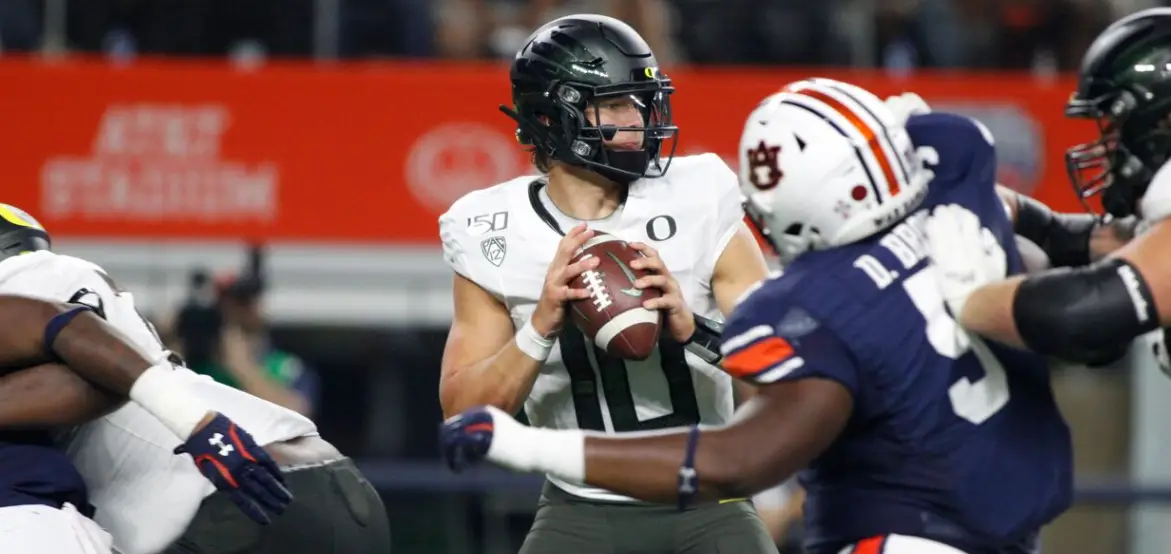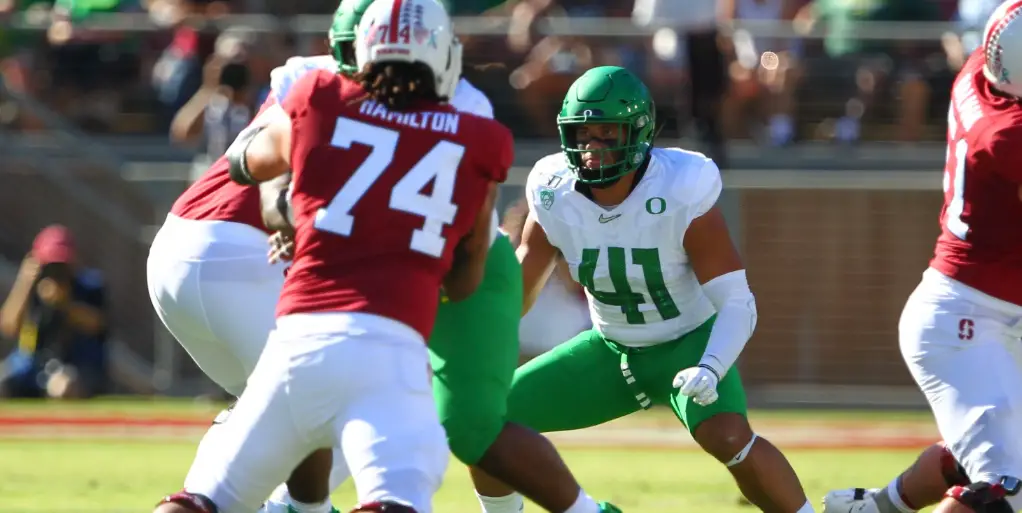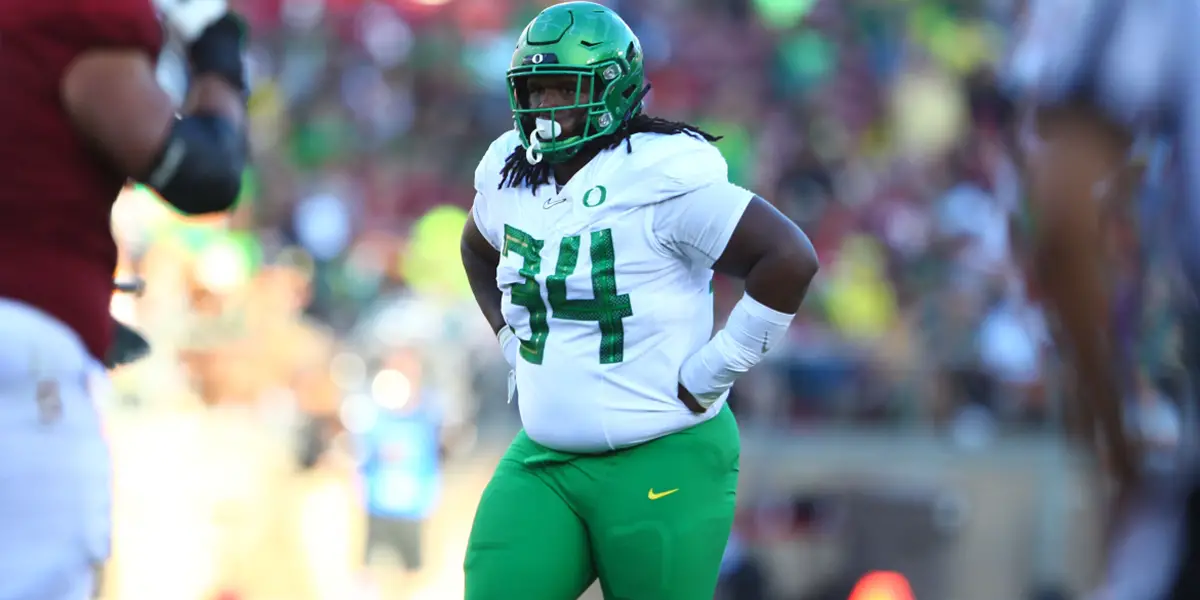A third of the way into the season, there’s plenty to be excited about as an Oregon fan. The Ducks’ defense is playing historically well, Oregon finally kicked its Stanford curse, and it even has one of the best punters in the country. Sitting at 3-1, with a clear path to a Pac-12 title and even an outside shot at the College Football Playoff, it would seem all is well for our feathered friends, right? Not quite …
The Ducks are coming off of a 21-6 victory over Stanford in a snooze fest that more closely resembled a ’90s Big Ten game than a 21st century Oregon matchup. Yes, a win is a win, and the result of the game was never in doubt, but it sure felt like Oregon left a lot of meat on the bone. Stanford clearly isn’t what it once was, so the 15-point win — in which the Ducks labored on offense for much of the game — was a bit underwhelming, especially when considering that UCF jumped out to a 38-7 lead against the same team just a week earlier.
What’s more concerning, though, is that the conservative and “safe” style that Oregon resorted to against Stanford is one that Mario Cristobal seems to embrace. Although that game plan worked out this time, that hasn’t always been the case. If Oregon continues to be satisfied with grinding out wins against bad teams by doing the bare minimum, the Ducks will get a rude awakening when they face a team far more capable than the Cardinal.
You Play to Win the Game
In Oregon’s two games against Power 5 opponents, the Ducks have played “not to lose.” Oregon scored just 21 points in both matchups — a point total that won’t result in many wins in today’s landscape. Poor execution has certainly been a factor in the low-scoring outputs. But every team has drops, every team takes sacks and every team makes mistakes from time to time. For Oregon, however, those execution issues have been compounded by an ultra-conservative approach that’s making touchdowns against Power 5 competition a rarity.

The Ducks struggled on the ground against Auburn.
The issues with Oregon’s running game have been well documented (the Ducks rushed for less than 100 yards against both the Auburn Tigers and the Cardinal), and many point to the lack of talent at running back as the problem. But perhaps the biggest reason the Ducks have struggled to run the ball is because of a timid scheme. While nearly every other program in the country has integrated option schemes in which the quarterback has a legitimate option to run the football, Oregon is so worried about an injury to Justin Herbert that it has essentially eliminated the “keep” option from its playbook.
Armchair coaches across the country collectively screamed at their televisions on Saturday as the Ducks ran multiple plays that appeared to be read options with massive backside rushing lanes for Herbert; however, every time, Herbert simply handed the ball off to CJ Verdell, who bulldozed his way into a loaded box. Stanford didn’t even acknowledge the potential of Herbert pulling the ball and running it himself on a read option, and for good reason.
In the passing game, the one-on-one downfield shots that are necessary to stretch the defense and lighten the box are nonexistent in the Oregon offense. Outside of an off-schedule touchdown pass to Spencer Webb against Auburn, the Ducks have been too risk averse to pass the ball more than 20 yards in the air if there’s any type of coverage on the receiver.
This “safe” approach to the passing game is extremely apparent on third-down situations. The Ducks are in the bottom half of the country, converting less than 40% of their third downs. A large reason for this disappointing statistic is the fact that, once Oregon has its back against the wall and faces a third-and-long situation, the goal is often to set up punter Blake Maimone to flip the field rather than to get a first down. Far too often, against both Stanford and Auburn, passes on third down went short of the sticks, or Herbert took a sack, unwilling to challenge the secondary.

Herbert has been tentative on third down.
Ultimately, the Ducks have shown they’re content to play the field position game and put the pressure on their defense to win in low-scoring dogfights. Optimists suggest “this is how championships are won” and Oregon simply “beat Stanford at its own game,” as if that’s something to be proud of. The truth is, championships are won by well-rounded teams that are willing to take chances. They’re not won by playing down to the level of 2-3 football teams.
The Stanford Formula is Not Sustainable
For everyone who’s proud of Oregon’s ugly, conservative style that it used to beat Stanford, all it takes is a short trip down memory lane to see that formula is a recipe for disaster against teams with an offensive pulse.
Stanford has one of the worst offenses in all of college football (the Cardinal entered Week 5 ranked 118th out of 130 FBS teams in total offense). This isn’t to take anything away from Oregon’s defense, which helped contribute to Stanford’s pitiful offensive ranking. But the point is, Stanford hasn’t been much of a threat to anybody. The Ducks could afford to struggle for much of the game offensively and play the field position game because they had nothing to fear from Stanford’s offense.

Oregon’s defense was forced to shoulder the load against Stanford.
Just a few weeks ago, when the Ducks played a team with at least a mediocre offense, the very same strategy that they employed against Stanford cost them a program-changing win. Auburn’s offense isn’t a juggernaut by any means, but it’s formidable. While Oregon’s defense played well for the majority of its matchup against the Tigers, it got little help from its offense, which went into a shell for most of the second half.
On the surface, the Ducks played picture-perfect, mistake-free football. After they mounted a 21-6 lead, they didn’t turn it over, and they changed field position a handful of times, putting the pressure on Auburn’s offense to win the game. Well, that’s exactly what the Tigers did.
Auburn isn’t the only team capable of winning in this way. The Ducks face a bunch of explosive Pac-12 offenses that will put pressure on an Oregon defense that can’t continue to be depended upon to shoulder the load. Washington State, Arizona, Washington and USC all have better offenses than anyone Oregon has played so far, and it’s going to take more than a few touchdowns to keep pace in each of those contests. There’s nothing wrong with trying to avoid mistakes and win the field position game, but when it comes at the expense of explosiveness and basic functionality on offense, it’s a problem.
Through four games, it’s apparent that the Ducks have the talent to win the Pac-12, and perhaps decisively so. Their defense is as good as ever. They have an elite, senior quarterback, and plenty of talent should be returning from injury soon. But if the Ducks keep playing it safe and continue to play “not to lose,” they’ll be on the outside looking in come Championship Saturday.
Joshua Whitted
Morgantown, West VirginiaTop Photo by Matt Zlaket

Natalie Liebhaber, the FishDuck.com Volunteer Editor for this article, works in the financial technology industry in Bozeman, Montana.
Related Articles:
Oregon Football: Early 2026 Ranking Projections
FishDuck Foaming Over Upside of 2026 Diamond Ducks
Unbelievable...Same SEC Stuff, Different Day
Why Oregon Football Always Belongs in the National Conversation
The B1G Won the 2026 Coaching Carousel...Big-Time!
Continuity? Lanning's Hiring Success is Put to the Test
Joshua is an adopted Duck fanatic, originally hailing from southwestern Pennsylvania. His love for the University of Oregon began as a young child when he became mesmerized by the flashy uniforms and explosive offenses of the Chip Kelly era, and now, he follows the team religiously. His fondest memory of the team is seeing De’Anthony Thomas race past Wisconsin defenders back in the 2012 Rose Bowl. A true football enthusiast, Joshua loves studying the intricacies of the game, and he aspires to become a professional sports journalist. Joshua now resides in Morgantown, West Virginia where he works in customer service. When he’s not watching Oregon replays, Joshua loves reading, writing, and spending time with his family. Contact: whittedjd@gmail.com

